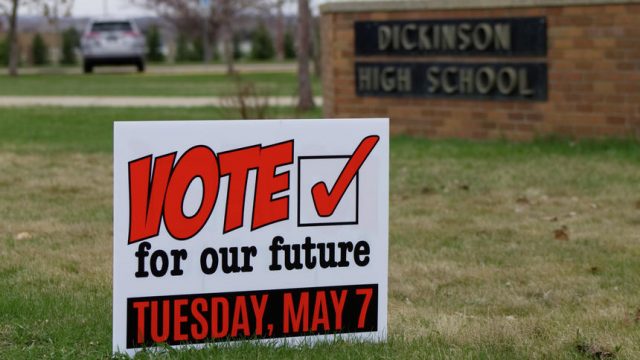Why Is a Construction Firm Printing Campaign Signs for a School District?

Over in Dickinson there is a bit of a kerfuffle over campaign signs promoting an upcoming bond election for a new high school.
The story behind those signs is of statewide interest.
At issue are the presence of campaign signs on school district property. Some say the signs – which say “vote for our future” – are taking a political stance on a ballot issue. Per state law, public property cannot be used to advocate a political position for or against a political party, a candidate, or a ballot issue.
Campaign sign controversies aren’t unusual in political battles. In going on 16 years of blogging I’m not sure I’ve seen a campaign season where there wasn’t some griping about somebody’s campaign sign being placed in an inappropriate spot, or distributed without the disclaimers and/or disclosures required by law.
What’s interesting about this Dickinson story isn’t so much whether the school district is using school property to advocate a political position – it sure seems like they are to me, though – but rather the genesis of the signs the school district is using.
This, from Kayla Henson’s story in the Dickinson Press, is what I’m talking about:
Superintendent Shon Hocker said he could not verify where the YES Committee got their signs, but said that the district got its design from JE Dunn Construction. Even if JE Dunn provided the template for both signs, Hocker does not see this as an issue.
“If JE Dunn provided the template for both the YES and the district, so be it,” he said. “That’s not a crime. That’s not an issue. I can’t speak for JE Dunn. … Let’s pretend I was a neutral Printing R Us company. If you came to me and said, ‘I want 1,000 vote YES signs. Will you make them for me? I’d say, ‘Yes.’ … If I had a group come in and said, ‘I want 1,000 vote NO signs. Will you make them for me?’ Would you make them? You would! … I just don’t see how anybody would be concerned or upset that the same company printed yes or no or neutral to three different organizations.”
This came up because the signs for the “vote yes” campaign supporting the bond, and the signs used on the school district property, were pretty clearly made by the same people. One says “vote yes” while the other, the one on school district property, merely tells people to vote for the future. Which still seems like a “vote yes” message to me. Here’s a photo of each sign, courtesy of the Dickinson Press:
But, again, the controversy over whether there is campaigning taking place on public property is beside the point. The involvement in the campaign for the bond, on behalf of both the school district and apparently the “vote yes” campaign, of a construction company with a major fiscal interest in the bond is unseemly. To say the least.
Since when do construction companies design and print campaign signs?
“Construction companies and engineering companies are now in the business of launching political campaigns so that they can get the contract for the $100 million schools. It’s completely legal, because there’s no law that says that it’s not,” Dustin Gawrylow, who was among those complaining about the signs, told the Press.
He’s right. Around the state elections to fund public projects – from water parks to recreation centers to school building projects – see involvement from the construction/engineering/architecture firms which stand to benefit financially from the projects. That’s certainly the case in Dickinson. “JE Dunn has an interest in the bond passing,” Henson reports. “Unless the bond passes, they will not be paid. In this contract, JE Dunn’s pre-construction services are free to the district. If the community votes in favor of the bond, the company will oversee the construction, receiving bids for the various phases of the project, for which they will be paid.”
Is the push for these projects really about public need in Dickinson and elsewhere?
Or is it about generating business for these firms?
The next time your community is having a debate about some new dog park or school building, look carefully at who is orchestrating the political campaign behind it. I think we’d all like to believe it’s citizen activists with the best interests of their communities in mind. More often than not, it’s someone who stands to get a big pay day if the project is approved.





